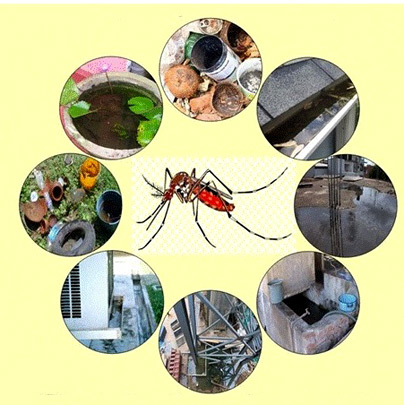
According to the Epidemiology Unit’s latest data, suspected dengue cases reported islandwide are on a sharp rise due to the recent heavy rains and flooding in all parts of the country.
Health officials fear that there could be an outbreak of the disease that would be difficult to control unless effective steps are initiated immediately. Since this task cannot be done by the Health Ministry alone, they have once again appealed to the public to act responsibly and get rid of all objects that attract the dengue vector Aedes Aegypti.
Admittedly the movements of the dengue mosquito is difficult to control. But precautions can be taken to be aware of the times of the day when it comes out for its blood feed and wear protective clothes so as not to be bitten.
The majority of researchers on dengue have emphasized the point that dengue is one of the most preventable infectious diseases with more than 90 percent of cases being caused by irresponsible garbage dumping on roads and lanes. “Put your garbage inside a black bag or gunny bag inside a bin with a cover. Leave it outside your door only on the days when the garbage van is expected to arrive,” says a health Ministry official to whom the Sunday Observer spoke.
 Here, family physician Dr. Ramya Premaratne discusses how dengue is caused, spreads its adverse outcomes if one is not diagnosed and treated in time and Do’s and Don’ts if one is infected with the virus. She also offers readers some useful simple guidelines on how to prevent getting the disease.
Here, family physician Dr. Ramya Premaratne discusses how dengue is caused, spreads its adverse outcomes if one is not diagnosed and treated in time and Do’s and Don’ts if one is infected with the virus. She also offers readers some useful simple guidelines on how to prevent getting the disease.
Excerpts
Q: Recent heavy rains and floods have resulted in a sharp spike in dengue cases islandwide with figures for January alone said to exceed the number of cases for the entire year in 2021, according to Epidemiology reports.
While most people are now aware of what dengue is, many are still ignorant of some of the most basic facts regarding the disease such as how it is caused, transmitted, symptoms to lookout for and most importantly how it can be prevented. For their sake tell us what dengue is. Is it a virus or bacteria borne disease?
A. It is a virus- borne disease which is spread through a human-to-mosquito-to-human cycle of transmission.
Q: What are its main transmitting sources?
A. Dengue viruses are spread to people through the bites of infected Aedes species mosquitoes (Ae. aegypti or Ae. albopictus).

Q: What about the Aedes albopictus which has also been linked to dengue?
A. Aedes albopictus is a mosquito that can transmit the viruses that cause dengue fever. The female mosquito lays eggs in water holding containers around or further away from homes, tree holes.
Q: At what times of the day does it normally bite? Why?
A. Aedes albopictus is a very aggressive daytime biter. Its peak feeding times are during the early morning and late afternoon.
Generally, mosquitoes come out to feed around sunrise, sunset, and at night. They’re rarely active during the mid day when the sun is out, since direct sunlight and high midday temperatures can quickly dehydrate them.
Q: Is it true that it takes 7-11 days for the adult mosquito to emerge from the egg, which can remain live up to one year in dry conditions and hatch on contact with water?
A. Under optimal conditions, the egg of an Aedes mosquito can hatch into a larva in less than a day. The larva then takes about four days to develop into a pupa, from which an adult mosquito will emerge after two days.
Q: How do we know we have been infected by the virus and have contracted dengue ? What are the symptoms to lookout for?
A. The most common symptoms of dengue are any of the following:
Fever
Nausea, vomiting.
Reddish macular Rash
Aches and pains (eye pain, typically behind the eyes, muscle, joint, or bone pain)
 Q: How long does it take for the virus to enter the body after a person has been bitten by an infected mosquito? What is the incubation period?
Q: How long does it take for the virus to enter the body after a person has been bitten by an infected mosquito? What is the incubation period?
A. Dengue fever usually occurs after an incubation period of 4-10 days after the bite of the infected mosquito.
Q: I understand the life-span of the mosquito is around 2-4 weeks and that it lays about 100-200 eggs at a time during this short period. Are these eggs visible to the naked eye? Can they be removed easily before the hatch?
A. Yes. They can be removed. These eggs can be seen by the naked eye. However it would be hard to count or remove them without either a magnifying glass or a microscope. The best way to find eggs on a filter paper is to inspect the paper with the naked eye and once an egg or group of eggs is found, one can use a microscope to remove the eggs. Dried filter paper makes it very difficult to remove the eggs so one hint is to wet the filter paper before you remove the eggs. If not, the eggs tend to “jump” and then become hard to find.
Q: What are the health impacts on a person who has been bitten by an infected mosquito?
A. The dengue virus is spread through a human-to-mosquito-to-human cycle of transmission Typically, four days after being bitten by an infected Aedes aegypti mosquito, a person will develop viremia, a condition in which there is a high level of the dengue virus in the blood. Viremia lasts for approximately five days, but can last as long as twelve days
Q: What happens when an infected person is bitten by an Aedes aegypti mosquito ?
A. When a mosquito bites a person who has dengue virus in his or her blood, the mosquito becomes infected with the dengue virus. An infected mosquito can later transmit that virus to healthy people by biting them. Dengue cannot be spread directly from one person to another, and mosquitoes are necessary for transmission of the dengue virus.
Q: Are there specific districts and regions that are considered endemic to dengue in Sri Lanka?
A. In recent decades a higher incidence of DF/DHF has occurred in the districts of Colombo, Gampaha, Kalutara, Kurunegala, Kegalle and Ratnapura,
Q: The viral flu is also raging in the country right now. As both dengue and influenza have similar symptoms how do we know which is which?
A. Normal viral fever may be accompanied with symptoms such as a runny nose, throat pain, mild body ache, weakness. In dengue patients may experience a high-grade fever, severe body ache, joint pains and rashes within 24 - 48 hours following a fever onset.
Q: Dengue is most common during the monsoon season. May- August and October- January. Is this correct?
A. Yes. dengue has a seasonal transmission in Sri Lanka, with two peaks occurring with the monsoon rains in June-July and October-December. The majority of cases occur during June-July, the summer monsoon.
Q: What kind of tests are needed to confirm whether one is having dengue?
A. NS1 antigen in a single diagnostic specimen is considered laboratory confirmation of dengue.
Q: When does a dengue patient require hospitalization? What are the signs to look out for?
A.
1. If the patient is suffering from severe abdominal pain.
2. If there is persistent vomiting, lethargy and restlessness.
3. If there is an abrupt change from high fever to very low body temperature.
4. If the patient begins to bleed or is looking pale.
5. If the patient’s limbs are cold and clammy.
6. If the liver seems enlarged.
Q. Who are those most vulnerable to dengue attacks?
A. Due to the potential worsening of pre-existing conditions, people under 15 or above 60 years old, pregnant women and patients with underlying conditions, such as obesity, diabetes mellitus, severe cardiovascular disease, asthma and chronic obstructive pulmonary disease (COPD), blood diseases, chronic renal failure, and immunosuppressive drugs, deserve special attention.
Q: Pregnant mothers? Can dengue affect their fetus? What are the complications?
A. A pregnant woman already infected with dengue can pass the virus to her fetus during pregnancy or around the time of birth. Dengue can have harmful effects, including death of the fetus, low birth weight, and premature birth.
Q: Home remedies for dengue mild cases?
A. Rest as much as possible.
Paracetamol to control fever and relieve pain. Do not give ibuprofen, aspirin, or aspirin-containing drugs. Sponge the person’s skin with cool water to reduce fever.
Prevent dehydration – Dehydration occurs when a person loses too much body fluid from fever, vomiting, or not drinking enough liquids.
Q: What are the most severe complications of dengue?
A. Severe dengue fever can cause internal bleeding and organ damage. Blood pressure can drop to dangerous levels, causing shock. In some cases, severe dengue fever can lead to death.
Q: I understand that the Ministry is currently carrying out a Dengue Prevention and Control program and recently declared a Dengue week for all public officers and civ8il society to clean out their premises. Tell us more of this program.
A. The program consists of case and vector surveillance, case diagnosis and management, integrated vector management, outbreak response, health promotion and research.
Q: From your own experience, what are the main obstacles and challenges facing those engaged in trying to eliminate breeding sites?
A. Although awareness on dengue prevention is universal, various challenges remain unanswered. Inadequate funding, limited resources hamper the dengue prevention, particularly in the villages and some suburban areas. The lack of an implementable and sustainable strategy to respond to the problem in an expanding geography of dengue worsens problems faced by the authorities despite the many efforts made in the past.
Q: Have you a message on how the public can help support your campaign?
A. Encourage residents showing symptoms suggestive of dengue to see their doctor early to be diagnosed. Educate residents infected with dengue to protect themselves from mosquito bites, by applying repellent and wearing long-sleeved tops and long pants to stem further dengue transmission.
Q: Do you have a message to the public in general on how we can drastically reduce the dengue vector mosquito population thereby protecting ourselves from the serious complications that could occur from dengue fever?.
A. My advice on how to avoid dengue Fever is :
Reduce Mosquito Habitat:
Stay in well-screened houses:
Use mosquito repellents:
Wear protective clothing:
Sleep under a mosquito-net:
Do not let water stagnate anywhere.
Keep your house airy and well-lit.
Q: Do you have a contact number and address if a person wishes to know more details of dengue?
A. Contact the National Dengue Control Unit,555/5, Elvitigala Mawatha, Narahenpita, Colombo 5.
Contact No: +94-112368416 / +94-112369893
